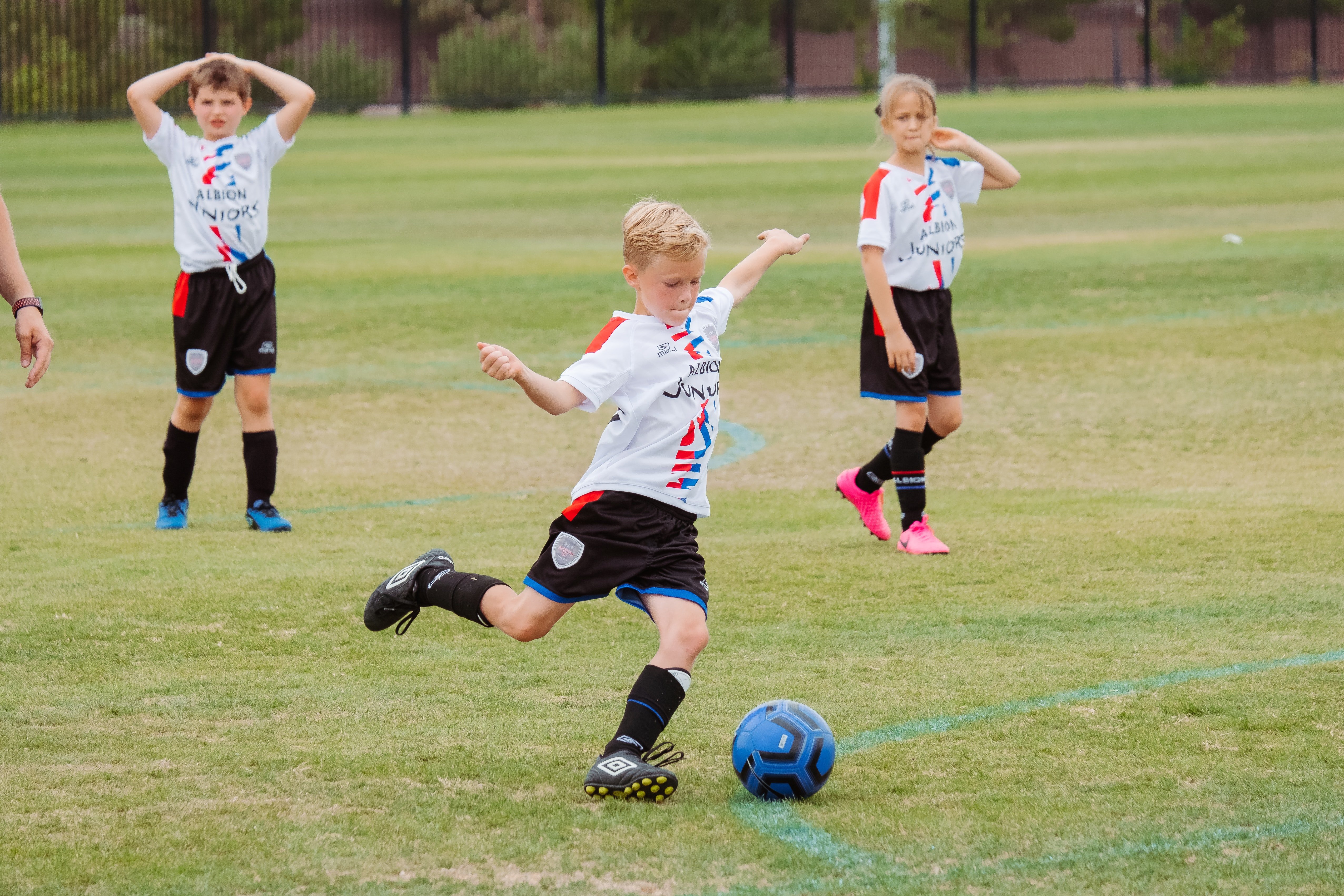
“I Don’t Let My Children Win, Even If It Means Upsetting Them” – Discussion of the Day

Children playing football | Photo: Unsplash/neonbrand
Each competitive event a child conquers provides more mental strength and resilience for futuristic challenging situations. Enforcing competitiveness in kids is quite tricky, but the outcome is impressive.
Is being competitive good or bad for children? It’s a topic that has divided opinions for years. Some argue that competitiveness encourages kids to excel in today’s intensely competitive world where we have to fight for everything, be it a job, partner, or business. Meanwhile, others claim that it destroys self-esteem and eventually leads to hatred among young competitors.
Many kids today have lived their entire lives, from sunrise until midnight, in a competitive tournament with their peers. From kindergarten till 12th grade, many schools boast about how “competitive” they are, hinting that it isn’t enough for students to simply do their best. Whether on the athletic field, in the classroom, or at home in front of the computer, kids are always expected to do better. Their childhood and entry into adulthood have become exhausting endurance tests.
To top it all, kids often feel lost, unable to figure out what they’re racing for, much less how to narrow down the competition. But has constant competition affected how kids see themselves compared to the world?
Like everything else, there are two faces to competitions: healthy and unhealthy. Suppose kids are advised to find comfort in the idea that they’re constantly competing for security in adulthood—in that case, they’re likely being tricked once more because they aren’t reimbursed for their efforts and competitiveness at the end of their entry into adulthood.
Competitions Are Meant to Bring Kids Together

Children playing tug-of-war | Photo: Unsplash/hagalnaud
So, why compete in the first place when several failures complement only one victory, and your kid is unfortunate enough to be in the defeated lot? Competitions are meant to bring kids together to help them realize that it’s about participating and not seeing each other as mere rivals.
However, to some extent, parental behavior is also responsible for how children are exposed to the competition. For some parents who are overly invested in the outcome of a competitive event, “competition” becomes a bad word when their kids are defeated.
In their opinion, competition places too much pressure on kids to outshine fellow kids, and it also causes unnecessary stress and leaves children disappointed. So, to shield their kids from potential disappointment, some parents either declare their kids a winner or avoid competitive scenarios altogether.
But is a shelf full of participation certificates and trophies really the answer? Can kids race against the fast-paced world just because their parents have declared winners without exposing them to competitive situations? Well, not really. According to child development experts, a little healthy competition can help kids elevate their skills and interests.
It Isn’t Always about Winning

Children in a marathon | Photo: Pixabay/maestro1942
Competitions aren’t always about victories. With a handful of wins come a bunch of failures, and that’s where some kids stand grounded. They tend to think that they’d end up losing again and eventually give up on their quest to compete. Eventually, some parents console their kids and pat their shoulders with those shreds of advice, encouraging them that there’s always a second chance. But what if the child loses again?
Most kids grow up learning the classic saying: “Failures are the stepping stones to success,” but how many of them are ready and willing to embrace failures and compete again? Honestly, this is where parents get trapped, thinking that their kids would find another failure or disappointment unbearable and eventually shield them from participating in another competitive event.
However, experts have pointed out that competitiveness helps kids set up for victories and failures later in life. Preventing kids from competing fearing their defeat equates to depriving their rights to enjoy their childhood.
Not everyone wins at the end of a race, and only one runner makes it to the finish line first. But that doesn’t mean the other runners are less talented and should stop participating in other races altogether. Healthy competitions among kids help them develop essential skills that can be invested into their adulthood.
When kids compete, they take turns to hone their talents, learn their flaws, and learn how to accept failures and not just success. According to Timothy Gunn, Psy.D., a pediatric neuropsychologist and judge on Lifetime Network’s “Child Genius: Battle of the Brightest” documentary series, kids who engage in competition earn crucial social skills through interacting with other kids. He thinks children learn the value of hard work and develop self-esteem and self-efficacy; he then added:
“Competition helps kids learn that it is not always the best or the brightest who are successful, but rather those that work hard and stick with it.”
A Crucial Set-Up

Families riding bikes | Photo: Unsplash/markstos
Encouraging your children to compete has another vital plus: It provides a healthy setting for your kid to learn how to be a team player. Of course, with zero exposure to competition, we wouldn’t know what or how it feels like to voice our opinions within a crowd.
For instance, a Redditor wrote that he never allows his two kids aged five years and under win board games, video games, and other competitive activities.
“I don't let my children win, even if it means upsetting them.”
In his opinion, he wants his kids to learn that victory isn’t what makes a competition worthwhile. Instead, it’s the time spent with the competitors and the opportunity to learn, practice, and improve.
Another Redditor posted a question that read:
“Some people think that sense of competition in children should be encouraged. Others believe that children who are taught to cooperate rather than compete become more useful adults. What do you think?”
While several Redditors had different opinions to share, one user wrote that a sense of fair competition is vital for people to learn. But another user pointed out that cooperation and growth are more valuable. Even more, one Redditor commented that kids could do both. In his opinion, his students compete at everything, and if a 7th grader can’t handle competition, they need to learn.
Kids are automatically exposed to many changes, both education and career-wise as they grow up. With zero exposure to competition, they may miss the opportunity to learn how to be good team players.
Emphasizing Healthy Competition

Mom tutoring her son | Photo: Pexels/julia-m-cameron
Parents should ensure the atmosphere promotes constructive competition among kids and not grudge, conflicts, jealousy, or hatred. This is also the precise reason why several child development experts stress the term “healthy competition” because it’s entirely cemented on a robust perspective to help your kids streamline their skills.
For example, when kids are exposed to healthy competition, they may:
- Want to participate in that particular activity again.
- Be able to accept victories and failures gracefully.
- Learn new skills and hone their talents.
- Enjoy their space as kids while learning to accept difficult situations and find better solutions to tackle them.
Again, you have to be extra careful to understand the competition your kids are exposed to and make sure they aren’t involved in unhealthy competition. If your kids are involved in unhealthy competition, they may:
- Resist participating in the activity.
- Say outright that they don’t want to compete again.
- Fake an illness to avoid the event.
- Show signs of anxiety, depression, loss of appetite—typical red flags that warrant further intervention and discussion.
Losing a nail-biter of a competitive game or falling short of winning the top prize isn’t easy for anyone, let alone kids. Some parents withhold their love and approval when their kid doesn’t perform up to their expectations or win a competition.
Eventually, the child can become panicked and start to believe that they lack potential in some way. More often than not, some children start working their tails off to gratify their parents. But trying to please their parents can be detrimental to their emotional and mental well-being. Instead, kids benefit when their parents give them love and approval without demanding a victory from their competitive event.
It’s Okay to Lose

Boy in his mother's arms | Photo: Unsplash/jwwhitt
It’s a great idea to support your children through their challenges and often reinforce the message that’s it’s absolutely okay to lose as long as they’re determined to learn from their experience. When you have the power to help your children think positively about competitiveness, it may help them define their futuristic accomplishments and set their goals ahead of what they intend to achieve.
One of the most crucial parts of nurturing a healthy competition is that kids learn to compete with themselves. Eventually, they know to put their efforts into practice, but reaching out to this level of understanding is possible only through your support.
For instance, when your kid loses in a cross-country running event, you’d conclude that he lost it because he was the slowest on the team. Rather than focusing that he’s the slowest, why not shift the focus to help him beat his record in an upcoming race?
As adults, we know what healthy competition is, but kids don't, and when they feel defeated, they tend to compare themselves with the other kids. Teaching children to race against the clock helps them compete against their fears and failures. As a result, kids will go from experiencing failure to tasting success and eventually enjoy participating in events irrespective of victories and defeats.
Healthy competition is good for kids as it’s pretty normal for people to judge themselves against others. However, it has to be nurtured in a supportive environment so that children learn to accept failures without losing their self-esteem.
Not All Are Winners

Dad talking to his son | Photo: Pexels/august-de-richelieu
As parents, we must end the stereotypical concept “all must win a trophy” culture and enforce children to play and enjoy competitive events from a young age. Competitiveness has several potential benefits and may help to:
- Prepare children for their future real-life situations.
- Develop essential skills at a young age and work towards sharpening them.
- Expand comfort zone among friends and family.
- Help embrace failures and not get disappointed after a defeat.
Meanwhile, those who are against inculcating competitiveness in kids claim that such competitions are destructive to self-esteem. They also fear that exposing children to competitive zones places too much pressure on kids, be it a spelling bee competition or a soccer match.
They claim that kids in a competitive environment are often left feeling defeated, disappointed, and inferior about themselves. To ward off such negative experiences, many parents eradicate the competitive aspect of every event and declare everyone a winner.
However, this “everyone gets a trophy” mentality is not what proponents of competitiveness believe in. Many parents feel that parenting isn’t just about security and safety but also about helping their kids experience the bumps that arise from competitive situations. Also, one of the worst mistakes parents make is protecting their children from failures. Honestly, failure isn’t a bad thing. Though it might feel uncomfortable, learning from failures motivates children to work harder and helps them stand their ground when situations become more challenging in the future.
Healthy competitions can teach children that it’s not always the best that are winners—the real winners are those who are determined and work hard! Competitiveness by itself isn’t a bad concept, it’s how parents approach competitions that make them healthy or unhealthy. In other words, if the sole motive is to win and not learn anything in the process, children may feel discouraged when they lose. But if we know how to perceive failure constructively, kids will learn more from the competitions they participate in.
As a parent, you have the power and freedom to help your kids think positively about competitiveness and let them know that it isn’t always about winning. It’s also about overpowering failures. Let us know what you think about this concept! Should kids be exposed to competitiveness to hone their future? Please share your thoughts with us. And don’t forget to share this article with all your friends! Thanks for reading!
